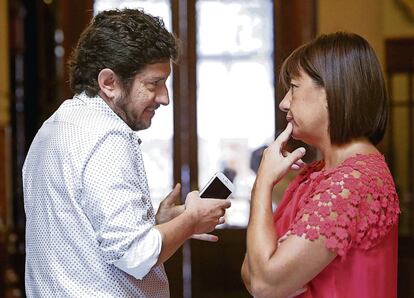Balearic Islands: the challenge of consensus politics in Spain
Four left-wing parties seem unable to agree on key policy questions including regulating tourism

On July 18, the Socialist Party (PSOE) and the left-leaning nationalists of Més per Mallorca, the coalition that has run the Balearic Islands since 2015, watched in disbelief as its unofficial allies in the anti-austerity Podemos joined forces with the right-wing Popular Party (PP) to vote against a key aspect of a bill to further regulate tourism on Mallorca, Ibiza, Menorca and Formentera. In response, the ruling coalition issued a decree capping the number of beds on the islands at 623,624.
The incident highlighted the complexities of the multi-party landscape that has emerged in Spain over the last five years after the traditional two-party system was challenged by dozens of new political formations. It also brought about debate in Podemos as to whether it should formally join the coalition.
It’s a pact held together by nothing more than a shared dislike of the PP Biel Company, PP leader in the Balearics
“There are clearly going to be differences of opinion in a coalition, and problems of this nature will arise from time to time, but the overall picture is that socially responsible policies are being administered efficiently,” says Iago Negueruela, the PSOE’s spokesman in the Balearics.
Biel Company, the PP leader in the Balearics, says: “It’s an unrealistic pact – held together by nothing more than a shared hatred of the PP.” The conservatives joined forces with Proposta per les Illes and Ciudadanos in the regional elections of 2015, but despite winning the most seats of any single party, it found itself excluded from power when the Socialists teamed up with Més per Mallorca, with backing from Podemos and Més por Menorca.
“It’s a pact to undermine PP legislation,” adds Company, whose party lost 15 MPs in the 2015 elections following a series of corruption scandals. “It’s a radical government. Podemos is unstable. The government leans on it, which makes it unstable too.”
“We have a radical government,” adds Ciudadanos spokesman Xavier Pericay. “They take a typically nationalistic ‘us-and-them’ approach, which results in constant tension.”
None of us and all of us hold the key to power Nel Martí Més per Menorca
But what is really going on in the Balearic Islands? Is politics splitting into ever smaller pockets of power? And where does the balance of power lie between the four left-leaning parties?
In January, Podemos expelled two of its deputies, including the president of the Balearic regional parliament, a move that undermined the government’s absolute majority. In April, the situation was exacerbated when Més per Menorca briefly pulled out of the coalition in protest over corruption allegations.
Since then, a commission has been set up to monitor the government’s performance.
According to the executive, it has kept 60% of its campaign promises since taking power. Officials have introduced fines of up to €400,000 for online platforms that continue to advertise unlicensed holiday rentals in the Balearics; they have implemented a ban on the killing of bulls during bullfights; introduced legislation to locate mass graves from the Spanish Civil War; put forward a bill to provide moral redress to victims of Civil War and Franco era repression; and drafted a property law that will force companies owning more than 10 properties to temporarily relinquish apartments that are vacant for more than two years.
They take a typically nationalistic ‘us-and-them’ approach, which results in constant tension
Xavier Pericay, Ciudadanos
These milestones have helped relieve the tension between the four allies. However, the fact that Podemos is not part of the coalition continues to be a sore point among the pact’s other members.
“Podemos doesn’t help much,” says Nel Martí from Més per Menorca. “We are very different groups with a lot of differences, which means a concerted effort is needed when it comes to dialogue. None of us and all of us hold the key to power.”
“The Balearic government works as well as it can,” says Alberto Jarabo, the regional secretary for Podemos. “It always reaches a consensus in the end. Our work consists of flagging up the errors and keeping the government on the right track from a position of constructive and loyal criticism. The debate on whether Podemos should join the government remains open. We have to have the courage to take decisions. It would give us the mindset of a ruling party, which is what we lack. The key to being able to govern at the national level is being able to govern at the regional level.”
English version by Heather Galloway.
Tu suscripción se está usando en otro dispositivo
¿Quieres añadir otro usuario a tu suscripción?
Si continúas leyendo en este dispositivo, no se podrá leer en el otro.
FlechaTu suscripción se está usando en otro dispositivo y solo puedes acceder a EL PAÍS desde un dispositivo a la vez.
Si quieres compartir tu cuenta, cambia tu suscripción a la modalidad Premium, así podrás añadir otro usuario. Cada uno accederá con su propia cuenta de email, lo que os permitirá personalizar vuestra experiencia en EL PAÍS.
¿Tienes una suscripción de empresa? Accede aquí para contratar más cuentas.
En el caso de no saber quién está usando tu cuenta, te recomendamos cambiar tu contraseña aquí.
Si decides continuar compartiendo tu cuenta, este mensaje se mostrará en tu dispositivo y en el de la otra persona que está usando tu cuenta de forma indefinida, afectando a tu experiencia de lectura. Puedes consultar aquí los términos y condiciones de la suscripción digital.








































